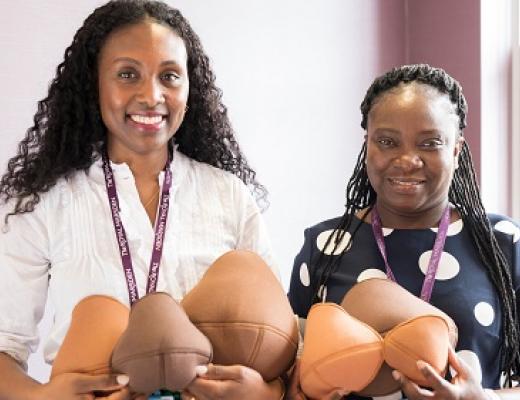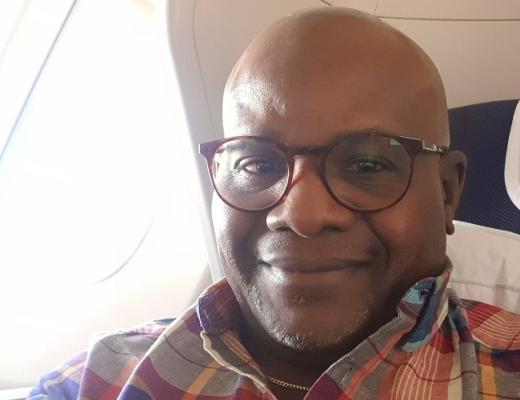Breaking barriers to inclusive care for Black women with breast cancer
Read our Q&A with The Royal Marsden's Breast Clinical Nurse Specialist, Sarah Adomah, about her research exploring the societal, cultural and healthcare barriers that impact Black women with breast cancer.

Why is this research specifically needed for Black women?
"There is a lack of research and information when it comes to Black women and breast cancer, especially in the UK. A lot of research has been done in the US and we can use some of this data, but we have to be mindful that the health system there is different. Not everything will be reflective of what we have here with the NHS, so we need to have some kind of authenticity of data within the UK as well."
"More importantly, Black women have different experiences when it comes to survival of breast cancer, and that's across the board, both in the US and the UK."
"The survival rate for Black women is lower than for white women, for many different reasons. Understanding this difference is one of the main drivers behind my research."
"We know that there are certain barriers which we can’t change, like a difference in the biology of the breast cancer that Black women develop, which can be particularly aggressive. There is also data in the UK which shows that Black women are diagnosed later, in stage 3 or 4, compared to white women who are more commonly diagnosed in stages 1 or 2. Breast cancer survival is a lot higher when found early, as many early treatments can be much more effective."
"However, there are also societal and cultural barriers for Black women, in addition to barriers relating to certain health systems."
"So, putting aside biology and genetics, I wanted to look into the practicalities of these barriers. What else can be done to support women who are diagnosed, and who are going through – or have gone through – treatment? And how can we lessen some of the barriers, hopefully impacting survival rates too?"
Can you tell us more about the focus of your pre-doctoral fellowship?
"The main focus is to explore and understand the adoption of preventative strategies, such as lifestyle changes, to help Black women going through breast cancer."
"Thanks to funding from The Royal Marsden Cancer Charity, I’m going to work with Black women to figure out what their understanding of lifestyle adaptation after breast cancer is, and better understand any barriers which may be preventing or impacting them from making lifestyle changes."
"Then, I’m hoping to understand what support and interventions could benefit these women. The aim is to really engage with them."

"I think it’s important to hear from the community. Historically, many of the interventions have been generalised, but we must understand that there are differences, even within Black women. The patient voice is so important, and it’s important for us to really understand by starting with a specific cohort of women."
"I’m focusing on African Caribbean women, to make it a more niche group and try to establish exactly what they need as a population and a group. What would and wouldn't help them going forward?"
You played a pivotal role in launching the new softies in diverse skin tones two years ago. How have they impacted patients since?
A softie is a lightweight, fabric prosthesis that women with breast cancer are often given to wear in their bra after a mastectomy. Some women use a softie temporarily – before reconstructive surgery or before using a permanent silicon prosthesis. However, many women use their softie long-term, as they can be more comfortable than other options. In 2022, The Royal Marsden became the first hospital to offer softies in a range of skin-tones, to help improve the care women of colour receive following a mastectomy.
"It has made a big difference. Often, I don’t think we talk enough about the psychological impact of breast cancer treatment. If you can help somebody to feel good about themselves – their body image, sexuality, confidence, femininity – you have made a huge impact on how that person then moves on."
"One of our patients who was the first to be fitted with the new softies told us that was the first time she had worn a fitted dress, because previously she had been wearing baggy clothing to try to cover herself up. Now she has the confidence to get out there and do things. These things may seem small to some people, but they make a tremendous impact."
"We couldn't have done this without The Royal Marsden Cancer Charity - the fact that we were listened to and given all the support we needed to launch this is amazing. We highlighted that this is the first of its kind in the UK, but actually it is the first of its kind in the world."

What’s next for the future of inclusive softies?
"We’re determined that this isn’t a service that’s going to be only available at The Royal Marsden. Often, we find that people ask to be referred to The Royal Marsden because they expect to get more here than they would anywhere else. But The Royal Marsden is not the only place where breast cancer is treated."
"We live in a multicultural country, and we need inclusive care that meets the needs of all people, we need resources which are equitable. My expectation and hope is that any woman, wherever they may be in the country, has access to care that is appropriate and meets their needs. That is the ethos of the NHS – we are here to give care to everyone. I would do absolutely anything and everything to get this embedded in healthcare services."
Did you like this story?
Find more of the latest stories from the hospital.


